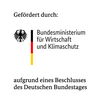As part of the German government's National Hydrogen Strategy, hydrogen (H2) is seen as a future energy carrier with high CO2 reduction potential for numerous applications in the transport sector. In parallel, biogas plants with plant-based input materials are established components of the energy system in Germany and in Europe. The decentralized location of biogas plants is advantageous for supplying regional hydrogen consumers, especially in the payload/public transport sector. These consumers are often located in the immediate vicinity of biogas plants, making road transport with compressed hydrogen a viable option. However, the conventional methods of industrial gas companies with filling station, transport trailers and service stations are too complex and too expensive for the rather small gas quantities generated by biogas plant as well as the often moderate and strongly varying demand profiles of the customers.
So-called mobile filling stations, which combine filling, storage and refueling in a hydrogen transport vehicle, are more suitable under the present boundary conditions, as they increase the flexibility of the supply and significantly reduce its costs. The research project BioH2Log aims to develop an innovative and scalable logistics system for hydrogen from biogas plants in order to supply regional consumers in the payload/public transport sector. For the decentralized production of green hydrogen, steam reforming of biogas is used, which is being tested in the cooperating funded project BioH2Ref.
A higher-level digital twin - consisting of linked simulations of the individual elements of the process chain (production, transport and refueling) - is to be created and implemented in a software-based tool. Using AI methods and taking the entire process chain into account, the tool is to optimize the individual elements in order to keep prices attractive for buyers. Based on this, an integral part of the tool is a platform for managing hydrogen trade, which links demand and real-time data from production and logistics. Test campaigns of the logistics system to validate the dynamic simulation use hydrogen produced by steam reforming. As a result, the readiness for use and the economic viability of BioH2Log for the regional supply of biogenic hydrogen will be demonstrated.

The project BioH2Log is funded by the German Federal Ministry for Economic Affairs and Climate Action (BMWK) and managed by Project Management Jülich (PtJ).
